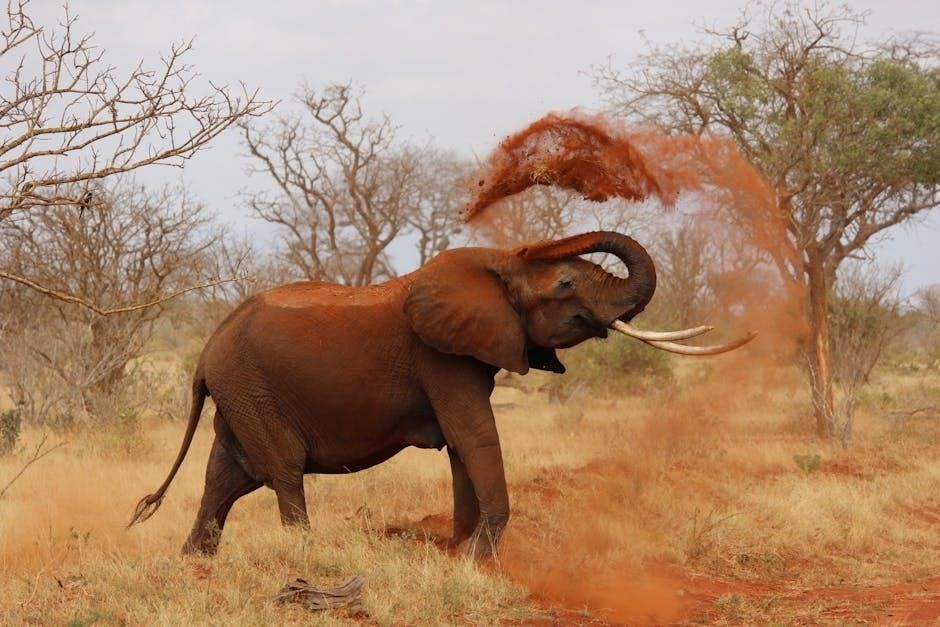shooting the elephant pdf
George Orwell’s “Shooting an Elephant” is a memoir recounting his experiences as a British officer in Burma, exploring moral dilemmas and colonialism’s complexities.
1.1 Overview of the Story
In “Shooting an Elephant,” George Orwell narrates his experiences as a British police officer in colonial Burma. The story revolves around an incident where the narrator is forced to shoot a rogue elephant that has caused destruction. Orwell reflects on the moral and ethical dilemmas he faced, highlighting the pressures of maintaining authority and the absurdity of colonial rule. The narrative explores themes of imperialism, power dynamics, and the loss of moral autonomy in a oppressive system. Through this personal account, Orwell critiques the exploitation and hypocrisy inherent in colonialism, offering a profound commentary on human nature and societal control.
1.2 Historical Context of British Colonialism in Burma
During the late 19th and early 20th centuries, Burma was under British colonial rule, marked by exploitation and cultural suppression. The British exploited Burma’s resources, imposing their administrative systems while disregarding local customs; This led to widespread resentment among the Burmese people. Orwell’s story reflects his experiences as a police officer in the 1920s, highlighting the tensions between British authorities and the local population. The historical context of colonialism in Burma provides the backdrop for Orwell’s critique of imperialism, exploring themes of power dynamics and moral conflict. This period of British rule deeply influenced Orwell’s perspective, as seen in “Shooting an Elephant.”
Themes and Symbolism in the Story
Shooting an Elephant explores themes of imperialism, power, and moral conflict. The elephant symbolizes oppression, highlighting ethical struggles and consequences of colonial authority and the destructive nature of colonial rule.
2.1 The Theme of Imperialism and Power Dynamics
In “Shooting an Elephant,” Orwell critiques imperialism, illustrating how colonial power dynamics distort moral judgment. The British Empire’s dominance forces officers like Orwell to act against their conscience, fearing ridicule and loss of authority. The elephant, a majestic creature, symbolizes the oppressed Burmese people, while its destruction represents the destructive nature of colonial rule. Orwell’s narrative exposes how imperialism fosters a cycle of oppression, where both the ruler and the ruled are trapped. This theme remains relevant, highlighting the ethical dilemmas and psychological toll of colonialism on individuals and societies, making the story a powerful critique of imperial power structures.
2.2 Symbolism of the Elephant
The elephant in Orwell’s story serves as a potent symbol of colonial oppression and the loss of freedom. Its untimely death represents the destruction of Burma’s natural majesty under British rule. The creature’s rampage parallels the chaos of colonialism, while its eventual killing symbolizes the inevitable destruction of indigenous culture and autonomy. Orwell’s reluctant act of shooting the elephant underscores the moral compromises enforced by imperialism, where even the oppressor becomes a pawn in the system. The elephant’s death mirrors the futility and tragedy of colonial domination, leaving both the colonizer and the colonized bereft of dignity and freedom.

George Orwell’s Biography and Writing Style
George Orwell, born Eric Arthur Blair, drew heavily from his colonial experiences in Burma, influencing his poignant and reflective writing style in Shooting an Elephant.
3.1 Early Life and Career of George Orwell
George Orwell, born Eric Arthur Blair in 1903 in Bengal, India, was the son of a British colonial officer. His early life exposed him to the complexities of colonialism, shaping his critical perspective. Educated in England, Orwell joined the Indian Imperial Police in 1922, serving in Burma for five years. This experience deeply influenced his writing, particularly in Shooting an Elephant, where he reflects on the moral dilemmas of colonial authority. His career as a writer began after leaving Burma, with his experiences forming the foundation of his literary themes.
3.2 Orwell’s Experience in Burma and Its Influence on the Story
Orwell’s five years in Burma as a colonial police officer profoundly shaped his perspective on imperialism. Witnessing the exploitation and resentment towards British rule, he developed a critical view of colonialism. These experiences directly influenced Shooting an Elephant, where he recounts a pivotal incident that highlights the moral conflicts of enforcing authority in a hostile environment. The story reflects his growing unease with the role of the oppressor and the loss of personal freedom under colonial rule, themes that became central to his later writings.

PDF Version and Availability
Shooting an Elephant is widely available in PDF format for free download, offering readers easy access to Orwell’s reflections on colonialism and moral conflict.
4.1 How to Download “Shooting an Elephant” in PDF Format
Visit reputable sites like Project Gutenberg or ManyBooks. Search for “Shooting an Elephant” and locate the PDF download option; Create an account if required, click the download button, and save the file to your computer. Ensure the site is trustworthy to avoid security risks and verify the book’s public domain status. Use a PDF reader like Adobe Acrobat to open the file. Check for available storage and organize your files appropriately for easy access.
4.2 Features of the PDF Edition
The PDF edition of “Shooting an Elephant” offers a clean, DRM-free format, making it easily accessible on various devices. It includes the full text of the story, along with additional essays and context. The PDF is optimized for readability on tablets, e-readers, and smartphones. Many versions are free to download from platforms like Project Gutenberg or ManyBooks. The file is lightweight, ensuring quick downloads and minimal storage requirements. This format preserves Orwell’s original prose while enhancing accessibility for modern readers.

Critical Analysis and Essays
Scholars interpret “Shooting an Elephant” as a critique of imperialism, highlighting moral dilemmas and the psychological impact of colonial authority. Essays explore its enduring relevance.
5.1 Interpretations of the Story by Scholars

Scholars widely interpret “Shooting an Elephant” as a critique of imperialism and its psychological impact on both colonizers and the colonized. Many view the story as a reflection of Orwell’s personal experiences in Burma, highlighting the moral dilemmas faced by colonial officers. The elephant’s death symbolizes the senseless destruction caused by colonial authority. Some analysts argue that the narrator’s actions reveal the internal conflict between moral conscience and the pressure to maintain imperial dominance. This interpretation underscores the story’s relevance in postcolonial studies, offering a nuanced exploration of power dynamics and their consequences.
5.2 The Story’s Relevance in Modern Literary Studies
“Shooting an Elephant” remains a pivotal text in modern literary studies, particularly in postcolonial discourse, for its exploration of imperialism’s psychological and moral complexities. Scholars analyze the story to understand the dynamics of power, identity, and ethical decision-making under colonial rule. Its themes of societal pressure and the performance of authority resonate universally, making it a valuable case study for examining human behavior. The narrative’s reflective tone and symbolic elements, such as the elephant, offer insights into the consequences of unchecked power and the tension between individual morality and collective expectations. This relevance ensures its continued presence in academic curriculums and critical discussions.
Orwell’s “Shooting an Elephant” remains a powerful critique of imperialism, offering timeless reflections on morality, power, and human nature, ensuring its enduring relevance in literary discourse.
6.1 Summary of Key Points
“Shooting an Elephant” by George Orwell is a poignant memoir exploring his experiences as a British officer in colonial Burma. The story delves into themes of imperialism, moral conflict, and the loss of personal freedom under oppressive systems. Orwell’s narrative highlights the psychological turmoil of a young officer pressured to shoot an elephant, symbolizing the destructive nature of colonialism. The story is enriched by Orwell’s real-life experiences in Burma, offering a critique of British colonialism. The PDF version is widely available, including free downloads from public domain sources, making it accessible for readers worldwide to engage with Orwell’s timeless critique of power and morality.
6.2 Final Thoughts on the Significance of “Shooting an Elephant”
Orwell’s “Shooting an Elephant” remains a timeless critique of imperialism and human morality. Its vivid portrayal of colonial oppression and personal ethical struggles resonates deeply. The story underscores the destructive nature of power dynamics and the loss of individual agency under systemic oppression. Orwell’s experiences in Burma infuse the narrative with authenticity, making it a powerful commentary on colonialism’s legacy. The story’s accessibility in PDF format ensures its relevance endures, offering readers a poignant reflection on the complexities of power and morality.
Leave a Reply